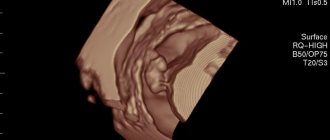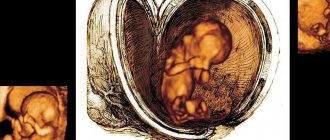Photo: UGC With the 12th week, a third of the pregnancy has passed - its most difficult first trimester. It was accompanied by psychological, hormonal changes in the woman’s body and toxicosis. The 13th week of pregnancy has arrived - the beginning of the 2nd trimester. Let's talk about the features of this important week: a woman needs to know them in order to behave correctly.
How you feel at 13 weeks of pregnancy
With the beginning of the second trimester (which is 12 - 13 weeks of pregnancy), most women feel a surge of vigor and vitality. Mood improves, irritability and tearfulness disappear.
During this period, the expectant mother develops an appetite, and only some pregnant women continue to be bothered by nausea in the morning (it will finally go away by the 16th week).
During the 13th week of pregnancy, the placenta produces the hormone progesterone, which has a relaxing effect on smooth muscle fibers. This is necessary in order to reduce the tone of the uterus and prevent miscarriage, but the digestive organs also experience the same effect, which is why constipation occurs.
At the end of the first trimester, at 12–13 weeks of pregnancy, intensive preparation of the breast for lactation began. The number of lobules in the mammary glands increases, which is often accompanied by engorgement and soreness, and the breasts may become 1 to 2 sizes larger.
As for the nervous system, from the 13th week of pregnancy the balance of the processes of excitation and inhibition occurring in the brain is restored. And if earlier the latter prevailed (you felt drowsy, were slow, uncollected), now everything falls into place. In the second trimester, your performance will increase and you will easily cope with home and professional responsibilities.
Features of intimacy during pregnancy
With deep penetration after sex, bloody discharge from the genital tract may appear due to trauma by the penis to the fragile epithelium on the surface of the cervix. But also spotting can be a sign of the onset of placental abruption and premature birth. Therefore, you should consult a doctor immediately!
You should not use toys from a sex shop, as you can injure the vaginal mucosa, which will lead to inflammation. This is especially true for vibrators. Mechanical vibrations can cause excessive uterine contractions and risk of miscarriage/premature birth.
Pregnancy is not a contraindication for cunnilingus. It is important that the man does not have fresh herpetic rashes or other infections on his lips. But anal sex should be postponed - it can provoke the development of hemorrhoids and the appearance of anal fissures, which can already begin to bother the expectant mother.
Active stimulation of the nipples can cause the risk of miscarriage/premature birth. This is due to the reflex production of oxytocin, a hormone that contracts the uterus.
Many caring fathers are afraid of harming the child or leaving such an intrusion into his space in the fetus’ memory. This myth is very common, but completely unfounded. The child cannot remember anything and will not experience any unpleasant sensations. And light swaying will not cause any harm.
What poses should you avoid?
There is only one - missionary. It is during sex in this position that a woman may experience discomfort due to pressure on her stomach. Even if the period is still very short, it is better to exclude such a provision.
Also, in the 2nd and 3rd trimesters, we abandon all positions in which the woman lies on her back. Because in the position of lying on her back, the future may experience difficulty breathing, dizziness, feel a lack of air, and weakness. Blood pressure decreases and in some cases even collapse with fainting occurs. This occurs because the enlarged uterus compresses the inferior vena cava.
Risk factors
The 13th week of pregnancy is very contradictory: on the one hand, everything is getting better, but most often it is during this period that expectant mothers experience candidiasis (thrush). The cause of the disease is candida fungi. They are present in the body of every person and in a passive state do not cause any problems, but under stress and immune failure they begin to become active and displace the normal microflora.
Signs of thrush are a feeling of sharp itching in the genitals and a curd-like white discharge. Do not rush to self-medicate: washing and douching with antiseptic agents will only bring short-term relief. And the lack of qualified medical care in the 13th week of pregnancy is fraught with increased uterine tone. In addition, a bacterial infection may be associated with candidiasis, in which case there is a risk of intrauterine infection of the fetus. The consequences of such an infection can be the most unpleasant.
How does the fetus change?
The 13th week of pregnancy is the period when the placenta has almost completed its formation. She has almost taken over the entire function of the corpus luteum and independently ensures the development of the baby. Its thickness ranges from 15 mm. It prevents the negative effects of most toxic substances on the fetus.
The most pronounced changes in the child’s body at this stage are:
- Active development of the central nervous system. A number of reflexes appear. The baby already shudders, bends over, puts his finger in his mouth.
- The fetal skeletal system continues to form. The spine is getting stronger and stronger. Calcium actively enters the bones, promoting their growth. Ribs appear. The limbs quickly increase in size.
- Multiple blood vessels are visible through the thin skin.
- The respiratory system continues to develop. The diaphragm moves, which after birth will take an active part in the breathing process.
- At this stage, the baby already has the rudiments of 20 baby teeth.
- The pancreas begins to synthesize its own insulin, and the first villi appear in the intestine, which are the main element in the process of parietal digestion.
The size of the fruit is from 12 to 13 centimeters, and the weight ranges from 25-30 grams.
Medical observation
If you have already registered with the antenatal clinic, then by the 12th - 13th week of pregnancy the first prenatal screening should be carried out. If for some reason this is not done, you need to urgently undergo an examination, which includes:
- Ultrasound examination of the fetus;
- Analysis for free b-hCG;
- Analysis for PAPP-A, or protein A.
Screening assesses the risk of neural tube defects, as well as chromosomal abnormalities associated with diseases such as Edwards syndrome and Down syndrome.
An ultrasound at the 13th week of pregnancy will show the shape and size of the baby, its movement. In addition, with the help of an ultrasound examination, the doctor will be able to assess the condition of the uterus, presentation and placenta insertion, and determine the approximate due date.
Also, at the stage of 13 weeks of pregnancy, it is necessary to do a clinical blood test and a general urine test. Based on their results, the risk of developing anemia, inflammatory and endocrine diseases is assessed.
What examinations need to be completed
Usually during this period (from 12 weeks to 14) all mothers are required to undergo screening, the results of which are of value only at this period.
- The examination itself is carried out in 2 main stages. First, the expectant mother undergoes an ultrasound, and then she takes a blood test.
- It is important not to leave a long gap between these procedures, since even 4 – 5 days can show different results.
- Such screening allows you to quite accurately understand and determine whether or not there are any abnormalities in the development of the fetus. At this time, the first screening is carried out for the last time.
Methods of performing ultrasound
There are also 2 main ones. Let's look at each in more detail. There is nothing terrible in such a study, and there is even more danger for the baby.
- Transvaginally. During this examination, a sensor is inserted into the vagina, and then the uterine cavity is examined. It is carried out without preliminary preparation.
- Transabdominal. In this case, the sensor is passed over the surface of the abdomen and all the main parameters of the child are viewed, as well as the general condition of the uterus, placenta and other pelvic organs. It is necessary to prepare for such a procedure in advance and allocate special time.
- You need to drink at least 4 glasses of water and not urinate for 1.5 hours. This is the only way to carefully and thoroughly examine everything and even find out the gender of the unborn child. But the latter may not work, since the baby does not always turn the right way.
- Many people do 2 of these examinations at once, and this is more desirable for the completeness of the examination. First, the abdominal plane is examined with a sensor, then the woman urinates, and lastly, the uterine cavity is examined using a sensor. This way you can examine everything with the highest quality, make accurate conclusions and a medical report.
Some parents take such pictures first in the baby's children's album - this is the first photograph and the first acquaintance.
What does an ultrasound show?
With the help of research, the doctor is able to obtain CTE data (coccygeal-parietal size - norm 63 mm, plus or minus 12 mm), and also determine the condition of the uterus (tone or hypertonicity). Such studies make it possible to determine whether there is a threat of miscarriage. If there is, then the woman may be admitted to the hospital to preserve the fetus.
In addition to the above, the doctor must indicate the following parameters of the fetus:
- Head circumference measurement.
- The length of the femur and humerus.
- The distance between the parietal tubercles.
- Length of the nasal bone (at least 3 mm). Measured to determine if Down syndrome is present (risk if length less than 2.5 mm)
- It is especially important that the heart rate is calculated (the norm is 147 - 171 beats per minute).
- The amount of amniotic fluid must be examined.
- If there is low placentation, this is also shown in the conclusion. In this case, a caesarean section may subsequently be performed, for which you need to prepare in advance and know about it.
An important indicator is placental abruption, if any. The study allows you to take the necessary measures in time. Therefore, it is extremely important to take all recommended tests and undergo examinations prescribed by the doctor.
Blood test (hCG level)
The second stage of screening gives results after blood tests. One of them is the analysis of the hormone human chorionic gonadotropin. This analysis can tell a lot about the course of pregnancy, the condition of the mother and baby. Norm – 6140 – 291000 m IU/m.
Its presence and increase in the blood of a pregnant woman is an indicator that pregnancy is proceeding normally. The peak increase begins in pregnant women from the 10th week, and until the 20th week the hormone remains unchanged, then the levels decrease almost several times and remain stable until childbirth. If changes and deviations from the norm begin, then the doctor prescribes an additional examination and makes a decision.
- Low hCG levels may be due to missed abortion, threatened miscarriage, delayed fetal development, ectopic pregnancy and increased gestational age.
- An increased level is caused by toxicosis and late toxicosis, diabetes, hydatidiform mole (conception without normal embryo development), taking hCG-containing drugs, as well as the presence of benign and malignant tumors of the gastrointestinal tract, ovaries and other organs.
Indicators may fluctuate slightly depending on the health status of a particular woman at a given time and the body as a whole. Only the attending physician can explain the overall picture.
Rarr-A
This test is carried out only from 11 to 13 weeks and in combination with the tests described above. The abbreviation can be literally translated from English as “pregnancy-associated plasma protein A.” Its quantity increases with the duration of pregnancy. That is, an increase or decrease in the indicator may indicate chromosomal abnormalities in the fetus.
- Women over 35 years of age must undergo a double test.
- Those who already have children with similar problems or have diseases in relatives (genetic disorders).
- If a woman, before becoming pregnant, had hepatitis, rubella, herpes or cytomegalovirus, and also terminated pregnancies in the past.
- The norm at 12 – 13 weeks is within the acceptable range – 1.03 – 6.01 mU/ml.
If the protein level is underestimated, this may indicate a frozen pregnancy or a threatened miscarriage. If the indicator is higher, it means that the gestational age has been incorrectly determined or there are pathologies in the development of the fetus. Therefore, an ultrasound is performed before these tests.
The gynecologist tells the full picture of the research. You should not interpret the indicators yourself. Only a doctor knows what condition a woman has and how the fetus develops. If there are any complications, then only the doctor prescribes procedures or medications. Self-medication is strictly prohibited.
If the picture is disappointing, then a conversation with specialists will help you make the right decision - to keep the child or not. But it is strictly not recommended to draw conclusions on your own.
Recommendations
Advice on proper nutrition remains the same for the 12th – 13th week of pregnancy. Your diet should be healthy, balanced and include seasonal vegetables and fruits, animal protein and dairy products. Try not to overeat and control your weight.
If you are concerned about constipation at 13 weeks of pregnancy, add cereal dishes and foods rich in fiber (bran, raw vegetables) to your menu. Don't forget to drink enough fluids: ideally, drink at least 8 glasses of water every day.
Spend more time outdoors, do simple physical exercises, and if possible, visit the pool. Throughout the entire period of waiting for the baby (including in the 13th week of pregnancy), try to avoid crowded places. Be careful when choosing household chemicals. In case of illness, do not self-medicate, but immediately contact a specialist.
If there are no medical contraindications, do not refuse intimacy in the 13th week of pregnancy: it has a positive effect on the body and helps to harmonize relationships with your “other half.”











